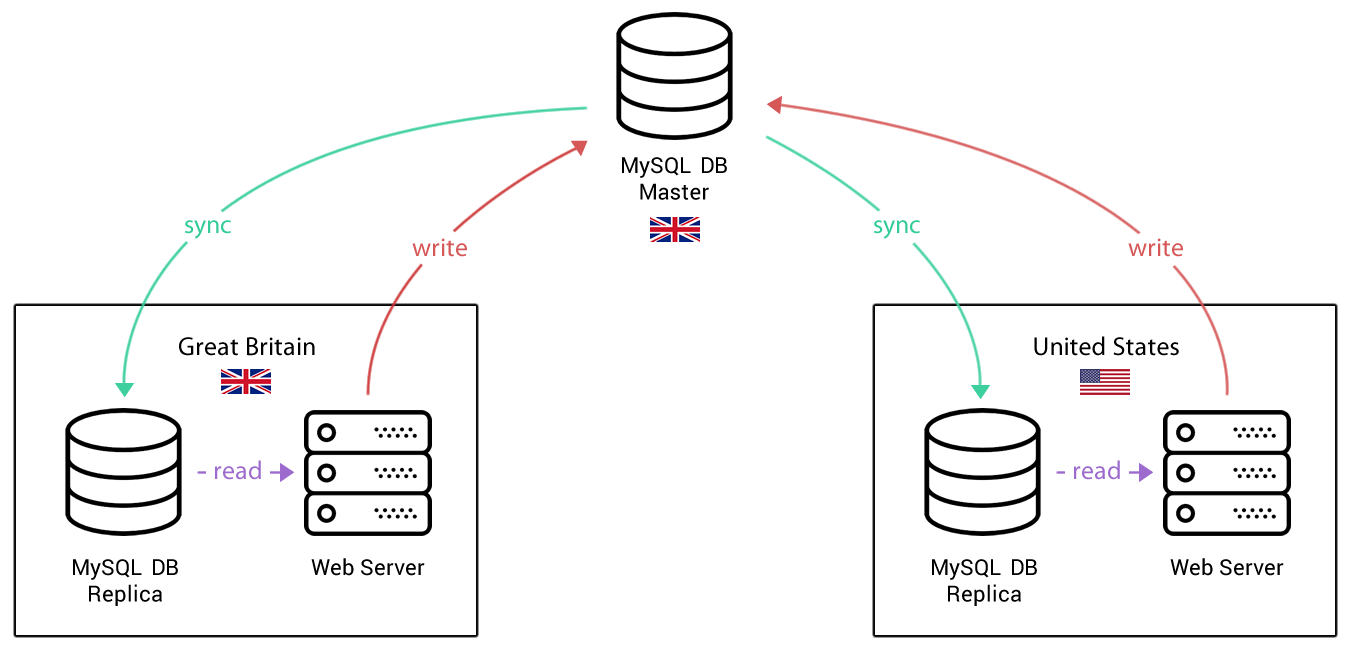| Package Data | |
|---|---|
| Maintainer Username: | CBS Industries |
| Package Create Date: | 2017-05-30 |
| Package Last Update: | 2017-07-08 |
| Language: | PHP |
| License: | MIT |
| Last Refreshed: | 2026-02-02 03:04:48 |
| Package Statistics | |
|---|---|
| Total Downloads: | 7,860 |
| Monthly Downloads: | 0 |
| Daily Downloads: | 0 |
| Total Stars: | 10 |
| Total Watchers: | 5 |
| Total Forks: | 3 |
| Total Open Issues: | 0 |
Implements a lazy MySQL database connection for Laravel that only connects to the individual read or write databases when they are actually used - by Zara 4
Only tested using Laravel 5.1
This assumes a set up where you have configured Laravel to use separate read and write MySQL database connections; and the write database is slow to connect, most likely due to a high latency connection caused by distance.
Zara 4 is a globally distributed image compression service, and currently uses the lazy-mysql database driver.
You can view our accompanying blog post for Laravel Lazy Read/Write Database Connection
If you are deploying your Laravel application globally on multiple servers across the world, you will likely encounter issues with database connection latency.
You can speed up read database queries using local MySQL database read replicas; however this does not overcome the delay caused by connecting to the write database if you have a single master write database in a remote location.

The standard Laravel MySQL database driver connects to both the read and write databases specified in your configuration as soon as the connection is first used.
The result is an unnecessary delay when you only want to read data from the database, Laravel still connects to the write database even though it isn't used.
Unlike the standard Laravel MySQL database driver, Lazy MySQL does not connect to the individual read or write databases until they are actually used by a query.
A request that only reads data from your database (SELECT) will only connect to the read database. A request that only writes data to the database (INSERT, UPDATE, DELETE) will only connect to the write database.
To install the Lazy MySQL driver into your laravel application run:
composer require zara-4/laravel-lazy-mysql
Add the LazyMySql service provider to your application config/app.php
'providers' => [
// ...
Zara4\LazyMySql\ServiceProvider::class,
// ...
],
The lazy-mysql driver reads database configuration in exactly the same way as the standard Laravel MySQL database driver.
Simply change the driver from mysql to lazy-mysql
'mysql' => [
'read' => [
'database' => env('DB_READ_DATABASE', env('DB_DATABASE', 'default-database-name-goes-here')),
'host' => env('DB_READ_HOST', env('DB_HOST', 'default-read-database-host-goes-here')),
],
'write' => [
'database' => env('DB_WRITE_DATABASE', env('DB_DATABASE', 'default-database-name-goes-here')),
'host' => env('DB_WRITE_HOST', env('DB_HOST', 'default-write-database-host-goes-here')),
'options' => [
PDO::ATTR_PERSISTENT => true,
],
],
'driver' => 'lazy-mysql',
'username' => env('DB_USERNAME', 'default-username-goes-here'),
'password' => env('DB_PASSWORD', 'default-password-goes-here'),
'port' => env('DB_PORT', 3306),
'charset' => 'utf8',
'collation' => 'utf8_unicode_ci',
'prefix' => '',
'strict' => false,
],
You can achieve significant additional speed improvements by ensuring the write connection is persistent.
To do this ensure the connection has the PDO::ATTR_PERSISTENT => true option (as in the example above)
'options' => [
PDO::ATTR_PERSISTENT => true,
],
Using the standard Laravel MySQL driver with a local MySQL read replica database and a remote MySQL write master database, took in excess of 500ms to connect and read a single record.
By enabling persistent connections with the PDO::ATTR_PERSISTENT => true option for the standard Laravel MySQL driver; the time to connect and read a single record was reduced to around 100ms to 150ms
By switching the database driver to lazy-mysql, the time to connect and read a single record was reduced to around 7ms to 15ms
The lazy-mysql database driver cannot overcome the delay caused when writing data to the remote master write database; however for requests that only ever read from the local read replica database, it can deliver significant performance improvements.
Lazy MySQL is open source and free - licensed under MIT.